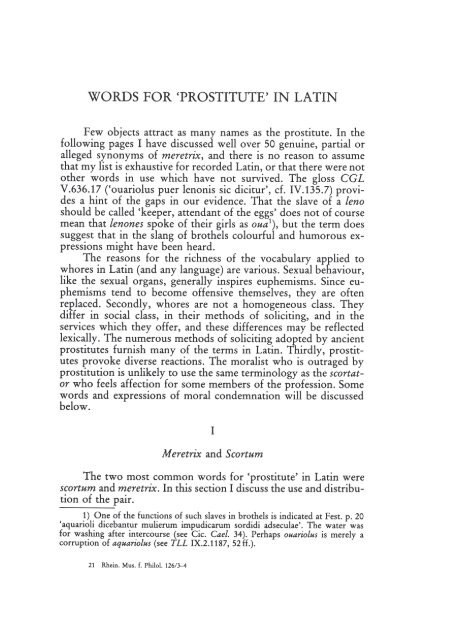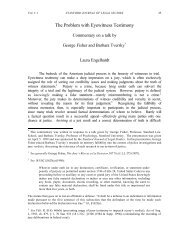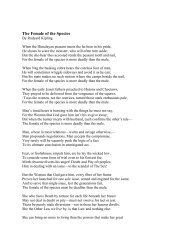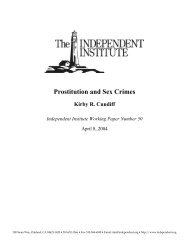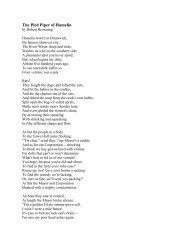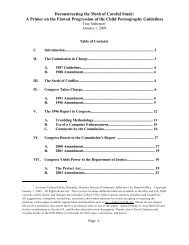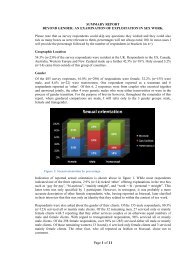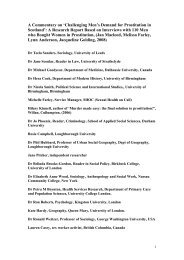WORDS FOR 'PROSTITUTE' IN LATIN
WORDS FOR 'PROSTITUTE' IN LATIN
WORDS FOR 'PROSTITUTE' IN LATIN
You also want an ePaper? Increase the reach of your titles
YUMPU automatically turns print PDFs into web optimized ePapers that Google loves.
<strong>WORDS</strong> <strong>FOR</strong> <strong>'PROSTITUTE'</strong> <strong>IN</strong> LAT<strong>IN</strong><br />
Few objects attract as many names as the prostitute. In the<br />
following pages I have discussed weIl over 50 genuine, partial or<br />
alleged synonyms of meretrix, and there is no reason to assume<br />
that my list is exhaustive for recorded Latin, or that there were not<br />
other wörds in use which have not survived. The gloss ceL<br />
V.636.17 ('ouariolus puer lenonis sic dicitur', cf. IV.135.7) provides<br />
a hint of the gaps in our evidence. That the slave of a leno<br />
should be called 'keeper, attendant of the eggs' does not of course<br />
mean that lenones spoke of their girls as oual), but the term does<br />
suggest that in the slang of brothels colourful and humorous expressions<br />
might have been heard.<br />
The reasons for the richness of the vocabulary applied to<br />
whores in Latin (and any language) are various. Sexual behaviour,<br />
like the sexualorgans, generally inspires euphemisms. Since euphemisms<br />
tend to become offensive themselves, they are often<br />
replaced. Secondly, whores are not a homogeneous dass. They<br />
differ in social dass, in their methods of soliciting, and in the<br />
services which they offer, and these differences may be reflected<br />
lexically. The numerous methods of soliciting adopted by ancient<br />
prostitutes fumish many of the terms in Latin. Thirdly, prostitutes<br />
provoke diverse reactions. The moralist who is outraged by<br />
prostitution is unlikely to use the same terminology as the scortator<br />
who feels affection for some members of the profession. Some<br />
words and expressions of moral condemnation will be discussed<br />
below.<br />
I<br />
Meretrix and Scortum<br />
The two most common words for 'prostitute' in Latin were<br />
scortum and meretrix. In this section I discuss the use and distribution<br />
of the pair.<br />
1) One of the funetions of such slaves in brothels is indieated at Fest. p. 20<br />
'aquarioli dieebantur mulierum impudiearum sordidi adseeulae'. The water was<br />
for washing after intercourse (see Cie. Cael. 34). Perhaps ouariolus is merely a<br />
eorruption of aquariolus (see TLL IX.2.1187, 52 ff.).<br />
21 Rhein. Mus. f. Philol. 126/3-4
322 J. N. Adams<br />
Scortum originally meant 'leather, hide' (Varro Ling. 7.84;<br />
for a word play see Apul. Met. 1.8 'qui uoluptatem ueneriam et<br />
scortum scorteum Lari et liberis praetulisti'). According to Donatus<br />
(on Ter. Eun. 424: 'abdomen in corpore feminarum patiens<br />
iniuriae coitus scortum dicitur') the word was used of the female<br />
pudenda; if this were true it would thence have been transferred<br />
pars pro toto to loose women. So cunnus was sometimes used pars<br />
pro toto (Hor. Sat. 1.2.36, 1.2.70, 1.3.107), as indeed various<br />
words for 'penis' (e.g. uerpa, CIL IV.1655, mentula, CIL<br />
IV.7089) and 'anus' (fossa, Juv. 2.10) were used of disreputable<br />
men. For the application of a word of this semantic field to the<br />
female parts one might compare bulga, 'leather bag' (Fest. p. 31<br />
'bulgas Galli sacculos scorteos appellant') at Lucil. 73 ('in bulgam<br />
penetrare yilosam'), but it was probably the shape rather than the<br />
material 0 the object which was primarily in Lucilius' mind. For<br />
an implied use of a word meaning 'skin' in reference to a bodily<br />
orifice with sexual significance, cf. Cato Grat. frg. 60 '< inter- ><br />
cutibus stupris obstinatus', Gell. 13.8.5 'intercutibus ... uitiis<br />
madentes', Fest. p. 98 'inter cutem flagitatos dicebant antiqui mares,<br />
qui stuprum passi essent'. Inter cutem and intercus literally<br />
mean 'under the skin' (> 'internai'?), but used of a stuprum 'under<br />
the skin' (pedicatio) it would have been the anus which was suggested,<br />
at least to some hearers.<br />
However scortum was from the time of Plautus the standard<br />
word for 'male prostitute' as welF). To explain this usage one<br />
would have to suppose that, if scortum had once been an anatomical<br />
term, it had been applied to apart of the male as well as apart<br />
of the female. An alternative hypothesis would be that once scortum<br />
had lost its association with the female pudenda, it came to be<br />
used of male whores. On balance it seems advisable to reject<br />
Donatus' explanation, especially since scortum is never attested<br />
elsewhere as an anatomical term.<br />
It seems more likely that whores were called 'hides, leather'<br />
partly because of the character of the materiaP), and more particularly<br />
because an association was felt between the working of<br />
2) Plaut. Cure. 473, Poen. 17, Cie. Dom. 49, Sest. 39, Phil. 2.44, Justin<br />
30.2.2, Petron 9.6, 119line 25, Aure!. Viet. Caes. 28.6<br />
3) See M. Hammarström, 'De uoeibus seoni, serattae, strittabillae', Eranos<br />
23 (1925), PI;>' 104ff., and espeeially p. 108: 'in seorti ... uoeabulo ad mutationem<br />
signifieationIs effieiendam non materia superfieiesque pellis ualuit, sed detraeta<br />
pellis per se, ut erat laxa, mobilis, ineomposita'. Hammarström quotes parallel<br />
usages from other languages (see further below).
324 J. N. Adams<br />
has merely been fondled. So at Pers. 227 the ancilla Sophoclidisca,<br />
who lays hands on the slave Paegnium to remove something from<br />
hirn (ib. 'habes nescioquid'), is told 'ne me attrecta, subigitatrix'.<br />
She takes the words in a sexual sense ('sin te amo?'). Clearly one<br />
who subigitat does no more than touch. The metaphorical use of<br />
subigito in Plautus is likely to have been based on the sense 'master,<br />
force to one's will' which subigo (and presumably subigito)<br />
possessed (at Suet. I ul. 49.4 it is clear from the context that subigo<br />
= pedico is a metaphor of mastering). It does not seem plausible<br />
that the act of fondling gently should have been likened to the<br />
working of leather.<br />
If scortum = 'prostitute' derived from a metaphorical application<br />
to sexual behaviour of the phrase scortum subigo (subigito),<br />
then subigo (subigito) 'knead, work' in that phrase would certainly<br />
once have had to imply the act of sexual intercourse: the distinctive<br />
act which is committed with a whore is not fondling but<br />
intercourse. It is therefore curious that in extant old Latin metaphorical<br />
subigito suggested mere touching. Unless subigito in its<br />
sexual application had undergone an amelioration of sense, the<br />
phrase scortum subigito (subigo) could have played no part in the<br />
semantic change of scortum. The second explanation given above<br />
of the change of meaning is plausible enough, but Plaut. Mi/. 652<br />
should not be cited along with Fest. p. 443 as if both display the<br />
same use of the verb.<br />
Meretrix ('woman who earns, paid woman', < mereo; cf.<br />
mereo at Gell. 2.18.3) can be compared with quaestuaria (Sen.<br />
Ben. 6.32.1 'ex adultera in quaestuariam uersa'), mulier quaestuaria<br />
(Dig. 23.2.43.7 'lenas autem eas dicimus, quae mulieres<br />
quaestuarias prostituunt'), corpora quaestuaria (Dig. 23.2.43.9 'si<br />
qua cauponam exercens in ea corpora quaestuaria habeat's), and<br />
also meritorius, which at Cic. Phi/' 2.105 ('ingenui pueri cum<br />
meritoriis, scorta inter matres familias uersabantur') serves as a<br />
masculine correspondent to meretrix (cf. Servo Virg. Ecl. 8.29<br />
'meritorii pueri, id est catamiti'), but is usually adjectival and<br />
applied superfluously to scortum (Suet. Claud. 15.4, Tert. Nat.<br />
2.10.1, p. 113.10, Arnob. Nat. 1.28, p. 18.26).<br />
The difference of tone between scortum and meretrix can be<br />
5) This use of corpus (cf. Ovid Tristia 2.311 'corpora Vestales oculi meretricia<br />
cemunt') is of course based on turns of phrase such as 'to earn a living by one's<br />
body'; e. g. Plaut. Poen. 1140 'facerentque indignum genere quaestum corpore',<br />
Bacch. 863 'illam, quae corpus publicat uolgo suom', Dig. 38.1.38 'quamuis adhuc<br />
corpore quaestum faciat'.
Words for 'Prostitute' in Latin 325<br />
seen in Plautus. Scortum was the more pejorative word, as can be<br />
deduced from the collocations in which the two terms were used.<br />
Both are common (scortum 44 times, meretrix 63). Scorta are<br />
often not the named characters in the plays, but the undifferentiated<br />
harlots who might participate in a temporary liaison at dinners,<br />
or be taken off somewhere for sexual purposes. Scortum is<br />
often translatable with an indefinite article in English, or else it is<br />
in the plural. A distinction can be made between whoring as a<br />
practice pursued by men with no lasting interest in the object of<br />
their attention, and the association, often prolonged, with an individual<br />
prostitute with whom the man might be in love. The<br />
object of the first relationship was a scortum (hence the general<br />
verb scortari, 'to chase after harlots'), and of the second a meretrix<br />
(meretricor is scarcely attested)6). Hence scortum ducere is a common<br />
phrase in Plautus (9 times) in the sense 'take a whore' (temporarily<br />
for sexual purposes; the name of the woman is usually<br />
not specified)\ but meretricem duco does not occur. 'Taking a<br />
whore' was a relaxation particularly associated with eating and<br />
drinking. In the context of symposia scortum (unlike meretrix) is<br />
frejuent, often juxtaposed with references to eating and drinking<br />
). The word is also commonly found in such contexts in other<br />
writers 9 ).<br />
Meretrix on the other hand is found 6 times 1o ) as the object of<br />
verbs such as amo (cf. HoT. Sat. 2.3.252), whereas scortum is not<br />
used in such collocations by Plautus. It is obvious that meretrix<br />
was more neutral and unemotive in tone, and that scortum was the<br />
'marked' term of the pair. Although the etymology of meretrix<br />
was transparent, and although it was the vox propria in contexts<br />
dealing with the earning of money by means of sexII), it is frequently<br />
(unlike scortum) used of the named prostitutes of such<br />
6) Not that meretrix eould not be used of a low whore (e. g. Suet. Dom. 22<br />
uulgatissimas meretrices). If so one would usually expeet its tone to be speeified by<br />
an adjeetive, or by some indieation in the eontext.<br />
7) The implieation of ducere in this expression iso illuminated by CIL<br />
IV.2450, quoted below p. 347.<br />
8) E. g. Men. 170,476, 1142, Mi!. 652, Most. 36; at Men. 476 and 1142 (cf.<br />
Bacch. 1189, Pseud. 1271) it is in the phrase scortum accumbere; meretricem accumbere<br />
does not oeeur.<br />
9) E.g. Cie. Cat. 2.10, Sall. Cat. 7.4, Livy 23.18.12, 23.45.2, Suet. Nero<br />
27.2, Apul. Met. 8.1, Apol. 98.<br />
10) See G. Lodge, Lexicon Plautinum (Leipzig, 1924-33), 11, p. 45a. 4<br />
11) E. g. Caeeil. 214, Turpil. 42, Plaut. Truc. 228 ff., 568,572 f., Rud. 56,<br />
541.
326 J. N. Adams<br />
importance in New Comedy, who of course were often 'good'<br />
and the object of romantic attachments 12 ).<br />
Various other passages illustrate the tone of seortum. The<br />
difference, for example, between 'taking a whore' and 'having a<br />
girl friend', amiea (a more permanent relationship) is particularly<br />
clear at Mere. 923-5 ('mater irata est patri uehementer, quia scorturn<br />
sibi / ob oculos adduxerit in aedis, dum ruri ipsa abest: /<br />
suspicatur illam amicam esse illi'). Note too the contrast at Truc.<br />
678 ('uel amare possum uel iam scortum ducere').<br />
Much the same distinction of tone between scortum and meretrix<br />
can be observed in the speeches of Cicero. Seortum is used<br />
only 3 times in the singular, always with the sense 'male whore' in<br />
passages of vilification (Dom. 49, Sest. 39, Phi!. 2.44); its pejorative<br />
quality is clear from the adjectives populare and uolgare which<br />
are applied to it at Dom. 49 and Phi!. 2.44. The 5 plural exam}'les<br />
are in uniformly abusive contexts; they refer usually to undifferentiated<br />
harlots who are in the company of Cicero's opponents<br />
(Cat. 2.10,2.24, Har. Resp. 59, Mi!. 55, Phi!. 2.105). Meretrix on<br />
the other hand is usually in the singular, referring to specific prostitutes.<br />
Such meretriees are for the most part the regular purveyors<br />
of sex, who inhabit ordinary brothels and associate with<br />
lenones (e.g. Verr. 1.101,4.83, 5.38). Since prostitution is often a<br />
cause of moral indignation, meretrix can take on a pejorative tone<br />
from the context (e.g. Verr. 1.138,3.83); but it is sometimes used<br />
quite neutrally (note Dom. 111, 112 twice). The meretrix Chelidon<br />
who appears often in the Verrines (e.g. 1.137f.) was obviously<br />
no low whore but a woman of some sophistication.<br />
Seortum was not a vulgarism. The difference between seortum<br />
and meretrix was one of emotive content; botli had a place in<br />
educated Latin. Although Terence almost restricts hirnself to meretrix<br />
(24:2; the examples of seortum, at Adelph. 965 and Eun. 424,<br />
are in the phrases 'have, take a whore'), in various historians it is<br />
seortum which is preferred (by 2:0 in Sallust, 11:0 in Livy, 6:2 in<br />
Justin, 6:1 in Curtius Rufus, 4:0 in Tacitus, and 2:0 in Florus). The<br />
frequency of seortum in these writers must reflect the moralising<br />
tone of Roman historiography; historians, unlike writers of New<br />
Comedy, had occasion to speak of whores mainly in contexts of<br />
condemnation.<br />
Neither word is common in poetry. Horace preferred meretrix<br />
(10:2), but he did admit scortum once in the Odes (2.11.21;<br />
12) On 'good' prostitutes, see H. Herter, 'Dirne', RAe III.1173ff.
Words for 'Prostitute' in Latin 327<br />
meretrix is also found onee in the Odes). Ovid has only meretrix<br />
(7 times, but not in the Metamorphoses). Scortum is found onee in<br />
Lueilius (1271), Lueretius (4.1274), Tibullus (3.16.4) and Juvenal<br />
(3.135). Catullus has scortum and scortillum in the polymetries<br />
(6.5, 10.3), and meretrix onee in the elegiaes (110.7). The evidenee<br />
of poetry does not allow one to make a distinetion between the<br />
two words; it would seem that both were unpoetie, and largely<br />
avoided in all genres. Neither word is found in epie (if one excludes<br />
Lueretius).<br />
Meretrix (but not scortum) survived in the Romanee languages<br />
(e.g. OFr. meautris, Provo meltritz; it is the dissimilated<br />
form meletrix whieh provided the Romanee reflexes)13). By the<br />
time of the Latin Bible translations one ean see signs of the disappearanee<br />
of scortum, although it is not only to meretrix that it<br />
gives plaee. It is found only 8 times in the Vulgate, always in the<br />
O.T. This distribution suggests that it would not have been eommon<br />
in the Old Latin versions 14 ). Meretrix is found 39 times, 9<br />
times in the N.T. The glossing of scor[p]tum by lupanar at CGL<br />
II.592.34 suggests that the original meaning of the word tended to<br />
be forgotten (unless of course lupanar is amistake for lupana 15 );<br />
cf. however prostibulum = 'brothel', below, p. 331, and the semantie<br />
development of Eng. brothel, 'prostitute' > 'brothel'). Meretrix,<br />
not scortum, is the word regularly used in glosses for 'prostitute,16);<br />
this ean only be beeause the one word was eurrent in the<br />
late period, the other not.<br />
II<br />
Euphemisms<br />
It is possible that most words for 'prostitute' begin as<br />
euphemisms, in that they have a literal meaning whieh does not<br />
explieitly refer to any of the sexual aets in whieh whores might<br />
13) See W. von Wartburg, Französisches etymologisches Wörterbuch VI.2<br />
(Basel, 1967), 29 f.<br />
14) But for scortum in aversion of Gen. 38:21 see the edition of B. Fischer<br />
(Vetus Latina, Die Reste der altlateinischen Bibel, 11, Genesis, Freiburg, 1951-54).<br />
15) See E. Wölfflin, ALL 8 (1893), p. 9, J. v. d. Vliet, ALL 9 (1896), p. 303.<br />
16) E. g. CGL 11. p. XII, 577.28, 586.10, IV.256.7, 362.22, 535.29, 30,<br />
V.219.26, 308.43, 496.68, 502.38, 528.7, 552.10, 599.14, etc.
328 J. N. Adams<br />
engage, or to the body parts which they employ17). Nevertheless<br />
most languages develop one or more 'basic' words for 'whore',<br />
which in the minds of most speakers have lost any innocent sense<br />
which they might once have possessed: they imply 'woman who<br />
sells sexual intercourse', and have no other semantic associations<br />
to soften their impact. Meretrix, for example, originally contained<br />
no reference to sexual intercourse, since it meant only 'woman<br />
who earns'. But in the historical period there is attested no general<br />
use of the word: it had become inextricably associated with earning<br />
by means of intercourse. In Vulgar Latin, where the dissimilated<br />
forms meletrix and menetrix (see TLL VIII.827,41 ff.) became<br />
established, it lost its connection with mereo 1S ). Hence Nonius,<br />
who at p. 684 L. writes the form menetrix, derives the word<br />
from maneo (he presumably had in mind IlEVW): 'nam menetrices<br />
a manendo dictae sunt'.<br />
Basic words for 'whore' vary in tone, even though they share<br />
the characteristic of having (to most speakers) no other meaning.<br />
Harlot and whore, for example, are pejorative, whereas prostitute<br />
is legalistic and unemotive. Courtesan on the other hand suggests<br />
a grand and sophisticated associate of the wealthy. In Latin, as we<br />
have seen, meretrix was less pejorative than scortum.<br />
Alongside such basic terms, most languages possess a rich<br />
supply of euphemisms, some with a limited currency, others<br />
adopted off-the-cuff by individual speakers in appropriate circumstances.<br />
Once a euphemism becomes widely current in common<br />
parlance it is of course in danger of degenerating into a basic term:<br />
it will become so firmly associated with the object to which it<br />
alludes that it ceases to be euphemistic. The fate of a euphemism<br />
depends partlyon how transparent its original meaning iso If that<br />
onginal sense becomes obliterated by (e.g.) phonetic devel0rments<br />
(such as meretrix > meletrix) or changes in the lexicon 0 a<br />
language (e.g. the disappearance of the original meanings of harlot,<br />
'(male) vagabond', et. sim.), then the euphemism may become<br />
a basic term.<br />
17) Exceptions can of course be found. Note xaJl.aL1:v1rT/ (Sud. um) mv<br />
xaJl.ai 'XELJl.EvrJV 0XEvEo8aL), and various loan-words based on Lat. stuprum<br />
(which, though euphemistic, nevertheless referred to sexual intercourse): Ir. stripach,<br />
NIr. striopach, OFr. strupe (> Eng. strumpet?): see C. D. Buck, A Dictionary<br />
of Selected Synonyms in the Principal Indo-European Languages (Chicago<br />
-London, 1949), p. 1368.<br />
18) Similarly 1r6pVTJ, which began as a euphemism, developed a pejorative<br />
tone (unlike traipa): see Chantraine, (see above, n. 4), III. p. 888.
Words for 'Prostitute' in Latin 329<br />
. Euphemisms too have differing tones. Some words for 'prostitute',<br />
although they can be described as euphemistic in that they<br />
carry no explicit reference to sexual behaviour, nevertheless express<br />
moral disapproval or indignation (e.g. woman o/shame).<br />
Others allude to an activity, itself not inherently sexual, which<br />
may still be considered degrading (e.g. street walker); hence they<br />
may be strongly pejorative. Others may be absolutely non-condemnatory,<br />
at least in origin.<br />
In a sense then the distinction between 'basic term' (word<br />
with no other meaning) and 'euphemism' (a word which strictly<br />
could be taken in another sense) is unsatisfactory, since the basic<br />
term may be less offensive in tone than the euphemism (prostitute,<br />
though unambiguous, is less emotive than street walker, which is<br />
ambiguous).<br />
In this section I discuss the main types of euphemism for<br />
'prostitute' in Latin, as well as a few words which have been<br />
thought to have that meaning.<br />
A word for 'whore' may often refer to an associated activity<br />
or attribute of the woman, itself non-sexual. Many of the Latin<br />
words fall into this category. lt is particularly the method of soliciting<br />
19 ) which is mentioned in euphemisms of this type.<br />
A common method of soliciting was to sit in front of the<br />
brothel or cella in achair, sella 20 ). For 'sitting' used of whores, see,<br />
e.g. Ovid Pont. 2.3.20 'in quaestu pro meretrice sedet', Mart.<br />
2.17.1 'tonstrix Suburae faucibus sedet primis', 6.66.2 'famae non<br />
nimium bonae puellam, / quales in media sedent Subura', Tert.<br />
Cult. Fem. 2.12 'uisa est quaestui sedere'. For the sella of a prostitute,<br />
see Plaut. Poen. 268 'quae tibi olant stabulum statumque,<br />
sellam et sessibulum merum', Juv. 3.136 'et dubitas aha Chionen<br />
deducere sella'.<br />
On this method of soliciting is based the Plautine prosed/l,<br />
which occurs at Poen. 266 in a catalogue of low whores: 'an te ibi<br />
uis inter istas uorsarier / prosedas' (for the status of these whores,<br />
19) On methods and pIaces of soliciting, see Herter, 'Die Soziologie der<br />
antiken Prostitution im Lichte des heidnischen und christlichen Schrifttums',<br />
]bAC 3 (1960), pp. 85 ff.<br />
20) For 'standing' and 'sitting', see Herter, ]bAC 3 (1960), p. 87, especially<br />
nn.320-4.
330 J. N. Adams<br />
see 267 'miseras sehoeno delibutas seruilieolas sordidas' and 269<br />
'quas adeo hau quisquam umquam liber tetigit neque duxit domum'fl).<br />
Cf. Fest. p. 252 'prosedas meretriees Plautus appellat,<br />
quae ante stabula sedeant. eaedem et prostibula'. Proseda was not<br />
eurrent after the time of Plautus, as ean be dedueed from Festus'<br />
remark. Another euphemism of the same type is sellaria: Schol.<br />
luv. 3.136 'inde sellariae dieuntur'.<br />
The implieation of the prefix of proseda ean be seen from<br />
Petron. 8.4 'iam pro eella meretrix assem exegerat', Isid. Etym.<br />
10.229 'prostitutae, meretriees a prosedendo in meritoriis uel fornieibus',<br />
and from Fest. p. 252 above (cf. p. 7 'sieut hae, quae ante<br />
stabula sedebant, dieebantur prostibula').<br />
The same prefix is found in prostibulum, lit. 'one who is in<br />
front of the stabulum, inn'22). The expression with a genitive<br />
eomplement at Plaut. Aul. 285 'bellum et pudieum uero prostibulum<br />
popli' suggests that prostibulum was well established at the<br />
time of Plautus. If its etymologieal sense were still strongly feit<br />
one would not expeet it to be eomplemented thus. A prostibulum<br />
was obviously a low dass prostitute: note popli in the passage<br />
above 23 ) and also eist. 331 'nam meretrieem astare in uia solam<br />
prostibuli sanest', where prostibulum, in contrast to the general<br />
term meretrix, indieates a whore who hangs about on the streets<br />
alone. So too at Lueil. 334 prostibulum is juxtaposed with lupa,<br />
whieh was also used of the lowest type of prostitute (see below, p.<br />
334). Nonius (p. 684 1.) deseribes the low status of prostibula in<br />
21) See further Herter, RAC 111.1155, C. Daremberg and E. Saglio, 'Meretrices',<br />
Dictionnaire des antiquittis grecques et romaines (Paris, 1877-1916),<br />
III.2.1835 n. 4,1836 n.1!.<br />
22) It is possible that prostibulum is a derivative of prosto. Just as stabulum<br />
literally means 'place where one stops' « sto), so prostibulum might originally<br />
have meant 'place where one prostat, stands in front, prostitutes oneself', i. e.<br />
'brothel'. But the meaning 'prostitute' is attested earlier than 'brothel' (see below,<br />
p. 331), and it is therefore preferable to take the word as a derivative ofstabulum. For<br />
the senses of stabulum (not 'brothel', but 'inn' or 'stable') see T. Kleberg, Hotels,<br />
restaurants et cabarets dans l'antiquitti romaine (Uppsala, 1957), pp. 18 f. Inns<br />
were a notorious haunt of prostitutes: note Dig. 23.2.43 'palam quaestum facere<br />
dicemus non tantum eam, quae in lupanario se prostituit, uerum etiam si qua (ut<br />
adsolet) in taberna cauponia uel qua alia pudori suo non parcit'. Hence the Pompeian<br />
graffito CIL IV. 8442 'futui coponam' almost certainly refers to intercourse<br />
with a whore, and it is even possible that copona (which had previously been used<br />
= copa only at Lucil. 128; its usual sense was 'inn': on the semanties, see below, p.<br />
339) would have been taken, at least by implication, as an equivalent of meretrix. See<br />
further Herter,jbAC 3 (1960), pp. 73f. Daremberg-Saglio (III.2.1836) take stabu<br />
La in the sense 'maisons de prostitution'.<br />
23) On the implication of this word, see below, p. 343.
Würds für 'Prüstitute' in Latin 331<br />
these terms: 'inter menetricem et prostibulum hoc interest. menetrix<br />
honestioris loci est et quaestus; nam menetrices a manendo<br />
dictae sunt, quod copiam sui tantummodo noctu facerent; prostibula,<br />
quod ante stabulum stent quaestus diurni et nocturni causa'.<br />
Prostibulum, like proseda above, transparently indicates a whore<br />
who engages in open soliciting. In most cultures a distinction is<br />
made between high dass prostitutes, whose services have to be<br />
obtained by devious methods (e.g. Eng. call-girl), and low whores<br />
who display themselves in public. Prostibulum must soon have<br />
fallen out of use, since it is restricted later to artificial writers and<br />
grammarians (e.g. Amm. 28.4.9, Festus). Because of its obsolescence,<br />
its gender and association with stabulum, it later acquired<br />
the sense 'brothel': e.g. Isid. Etym. 18.42.2 'idem et prostibulum,<br />
eo quod post ludos exactos meretrices ibi prostrarentur'; Hist.<br />
ApolI. Tyr. 33 'cum ille eam in prostibulo posuerit'; cf. Vulgo<br />
Ezech. 16:24.<br />
Various words of the same root as prostibulum are worth<br />
mentioning: prostibula (Tert. Apo!. 6.3 'inter matronas atque prostibulas'),<br />
which is marked for gender, prostibilis (Plaut. Pers. 837<br />
'hic faceret te prostibilem propediem'), prostibulata (CGr<br />
IV.149.34, V.138.22, 476.59 (prostribulata)), prostibulatrix (prostr-)<br />
(CGr V.511.42), and (probably) prostibulus (adj.) (H.A.,<br />
Comm. 2.8 'mulierculas formae scitioris et prostibula mancipia<br />
... contraxit', Opell. Macr. 4.3 'Macrinum libertinum, hominem<br />
prostibulum'), although in these two passages it is just possible<br />
that the noun prostibulum has been used in apposition to another<br />
noun. With the possible exception of the Plautine prostibilis, all of<br />
the above words were undoubtedly learned and artificial.<br />
At CGr IV.148.10 proposita is given as a word for 'prostitute'<br />
(prostituta proposita). There appears to be no other example<br />
of this substantival participle, but at Cic. Verr. 5.34 the verb (=<br />
'put out for sale') is applied to a prostitute's services ('mulierem<br />
nuptam uni, propositam omnibus'). A glossator may artificially<br />
have brought the substantive into existence on the basis of such a<br />
verbal usage.<br />
For whores 'standing' to solicit, see Plaut. Cist. 331, Cic.<br />
Verr. 2.154, Hor. Sat. 1.2.30, Juv. 11.172.<br />
The above uses of pro- and sto can be seen in prosto, lit.<br />
'stand in front' > 'be a prostitute' (e.g. Sen. Contr. 1.2.1., 1.2.3,<br />
Petron. 55.6, line 16, Juv. 1.47, 3.65, 9.24, Suet. Tib. 43.2). Indeed<br />
the circumlocution quae prostitit at Sen. Contr. 9.2.11 is<br />
equivalent to 'whore': 'ea imperat praetori quae prostitit'.
Words for 'Prostitute' in Latin 333<br />
another derivative of peto, petulans, at Pers. 1.133 'si cynico barbam<br />
petulans nonaria uellat' and Aurel. Vict. Caes. 23.2 'hoc<br />
impurius ne improbae quidem aut petulantes mulieres fuere' (cf.<br />
Fest. p. 226 'petulantes, et petulci etiam appellantur, qui proteruo<br />
impetu, et crebro petunt laedendi alterius gratia'). The same idea<br />
would lie behind the application of procax to prostitutes: Fest. p.<br />
251 'procare poscere. unde procaces meretrices ab assidue poscendo,<br />
et proci uxorem poscentes in matrimonium'. But it is not<br />
absolutely certain in any of the above cases that the grammarians<br />
or glossators had in mind substantival, as distinct from attributival,<br />
uses of the various adjectives.<br />
Lupa can be dealt with here, although it differs from the<br />
above words in that it is figurative. It was surely the rapacity of<br />
the shewolf which inspired the image (note Isid. Etym. 10.163<br />
'lupa, meretrix, a rapacitate uocata, quod ad se rapiat miseros et<br />
adprehendat'; cf. however Servo on Virg. Aen. 3.647 'lupae, id est<br />
meretrices, dictae ab obscenitatis et odoris similitudine', who derives<br />
the imagerather from the obscenity of the she-wolf)26). If so,<br />
like the words discussed immediately above, lupa would have<br />
stressed the predatory character of prostitutes.<br />
A 'she-wolf' in the literal sense was originally called a lupus<br />
femina (in Fabius Pictor and Ennius: see Quint. 1.6.12; cf. Enn.<br />
Ann. 70). The feminine lupa is attested first of whores (Plautus,<br />
Lucilius: see below) rather than of the female wolf itself. Similarly<br />
the first example of the feminine of miluus, milua, is a term of<br />
abuse directed at a woman (Petron. 75.6); greviously miluus had<br />
been used both of the male and female bird ). In popular identifications<br />
of this sort the need was felt to mark the gender morphologically28).<br />
Certainly there can be no doubt that lupa was conceived<br />
as the feminine of lupus: the imagery is explicit in the<br />
double entendre at Plaut. Truc. 657 ('nam oues illius hau longe<br />
apsunt alupis'), at Novius 7 ('cum ad lupam nostram tarn multi<br />
crebro conmetant lupi') and at Laber. 56 ('catulientem lupam'). It<br />
26) The same metaphor was found in Greek: note Messalina's nom de guerre<br />
Lycisca Guv. 6.123). Daremberg-Saglio (III.2.1835 n. 2), supporting the view<br />
that the tenn lupa was based on the rapacity of whores, point out that Lyco is the<br />
name of a usurer in Plautus' Curculio, and Lycus of a leno in the Poenulus. On the<br />
other hand for the promiscuity of wild animals, see A. S. Pease, Publi Vergili<br />
Maronis Aeneidos Liber Quartus (Cambridge, Mass., 1935), p. 450.<br />
27) See A. Stefenelli, Die Volkssprache im Werk des Petron im Hinblick auf<br />
die romanischen Sprachen (Vienna, 1962), p. 139.<br />
28) See Stefenelli, loc. cit. for further examples. Cf. TLL VIII. 986.75 H.
334 J.N.Adams<br />
was of course not unusual to apply animal names abusively to<br />
humans, induding women (cf. milua above). Whores are called<br />
limaces liuidae at Plaut. Cist. 405. The leno Ballio calls one of his<br />
whores excetra at Pseud. 218 (denoting duplicity: cf. Pers. 299,<br />
Poen. 1034, Truc. 780). Cf. Truc. 269 clurinum pecus (of prostitutes).<br />
Lupa must have had a long currency in speech, since it survives<br />
in the Romance languages (OFr. louve, Sp. loba, It. lupa).<br />
Augustine curiously implies that the usage was archaic by his time<br />
(Ciu. 18.21 'meretriees autem lupas uocabant, unde etiam nune<br />
turpia loca earum lupanaria nuncupantur'), but he must be wrong.<br />
Lupa may have been eurrent in social eirdes with which Augustine<br />
was not familiar. The word was presumably weIl established<br />
by the time of Plautus. Although he uses it only once (Epid. 403<br />
'diuortunt mores uirgini longe ac lupae'; cf. 404f. 'num(quam)<br />
nimis potest / pudicitiam quisquam suae seruare filiae'; note that it<br />
is the character of the whore that is at issue here; as we have seen,<br />
it was an aspeet of the eharaeter of the dass that inspired the<br />
image), the derivative lupanar is found at Bacch 454 29 ).<br />
Lupa indieated a partieularly low whore 30 ). At Mart. 1.34.8<br />
('abscondunt spurcas et monurnenta lupas') it refers to the prostitutes<br />
who plied their trade in graveyards 31 ). The adjective spurcas<br />
leaves no doubt as to the status of the referents, and indeed there is<br />
a eontrast implied with the ordinary meretrix whose provinee is<br />
the brothel (cf. 5 'at meretrix abigit testern ueloque seraque'). At<br />
Juv. 6.016 ('flaua ruinosi lupa degustare sepulchri') lupa is used of<br />
the same type of meretrix bustuaria. The tone of Martial's example<br />
should be compared with that of Catull. 99.10 'commietae<br />
spurca saliua lupae'. It is also worth recalling that Lucilius (334)<br />
juxtaposes lupa with prostibulum.<br />
Although lupa is used once by Cicero (apparently as the<br />
dimax in aseries of words indicating increasingly squalid purveyors<br />
of sex: Mil. 55 'ille, qui semper secum scorta, semper<br />
exoletos, semper lupas dueeret'), the distribution of the word in<br />
29) Lupanar may however have been a fairly recent coinage, since it is not<br />
the standard word for 'brothel' in Republican Latin. Lustrum is common in Plautus<br />
and Cicero, and found also in Turpilius (149), Afranius (242) and Lucilius<br />
(1034). Lupanar becomes more common during the first century A.D. (for lustrum<br />
see TLL VII.2.1885.64ff.; for lupanar, TLL VII.2.1846.25 H.).<br />
30) Cf. Herter, RAC III.1155, TLL VII.2.1859.23.<br />
31) On this form of prostitution, see Herter, JbAC 3 (1960), p. 86; cf. M.<br />
Citroni, M. Valerii Martialis Epigrammaton Liber Primus (Florence, 1975), p. 114.
Words for 'Prostitute' in Latin 335<br />
the Republic and early Empire (and indeed its survival in Romance)<br />
suggests that it belonged mainly to low speech. Most examples<br />
are in mime and farce (Novius 7, Laber. 56), satire (Lucil. 334,<br />
Juv. 3.66, 6.016) and epigram (Catull. 99.10, Man. 1.34.8). A<br />
freedman's derivative lupatria in Petronius (37.6), with its Greek<br />
suffix (cf. JrO{!Vl;lrr{!W, h:at{!ÜJi{!W), suggests that lupa was current<br />
in the low social circles in which hybrid words were formed<br />
32 ).<br />
Two other poorly attested derivatives of lupa should be<br />
mentioned here: (1) lupana, a back formation from lupanar (e.g.<br />
CGL IV.362.22; cf. TLL VII.2.1845.76ff.; however all examples<br />
of this word are attested only as textual variants, and it is possible<br />
that it is only a ghost formation); (2) lupanaria, based on lupanar<br />
(CGL V.308.53 (lupiraria cod.), Euseb. Emes. Serm. 7.15, p.<br />
186.10). Both words, if genuine, were undoubtedly anificial.<br />
Petronius' phrase mulier secutuleia at 81.5 is generally taken<br />
to mean 'prostitute'33). If this were the true meaning, it too, like<br />
some of the words above, would be a euphemism based on soliciting<br />
in the streets. However the sense 'prostitute' seems ill-suited<br />
to the context: 'tamquam mulier secutuleia unius noctis tactu omnia<br />
uendidit', = 'he sold all he had for a one night stand like a<br />
mulier secutuleia'. A whore does not pay for intercourse. A mulier<br />
secutuleia must be a woman (such as a uetula) so desperate for<br />
intercourse that she is willing to buy it (she 'chases' men). For this<br />
type of woman, see Juv. 6.355 ff., 10.319.<br />
Festus gives the meaning 'prostitute' to alicaria: p. 7 'alicariae<br />
meretrices appellabantur in Campania solitae ante pistrina alicariorum<br />
uersari quaestus gratia, sicut hae, quae ante stabula sede-<br />
32) Lupatria is not used literally by the freedman, but is a generalised abusive<br />
term: TLL VII.2.1848.26f. 'significari uidetur mulier ad omnia attendens,<br />
quam nihil fugit'. So Apuleius' lupula (Met. 3.22, 5.11) does not specifically indicate<br />
a whore, but an excessively lustful woman. For doubts about the usual interpretation<br />
of lupatria, see now G. Neumann, 'lupatria in Petron. c. 37,6 und das<br />
Problem der hybriden Bildungen', Würz.]ahrb. 6a (1980), pp. 173ff. (suggesting<br />
lupatrix (-tris».<br />
33) So C. T. Lewis and C. Short, A Latin Dietionary (Oxford, 1879), s.v.<br />
For the suffix, cf. sterteia at Petron. 75.9 and various other words collected by W.<br />
Heraeus, Die Sprache des Petronius und die Glossen (Offenbach a. M., 1899), p. 24<br />
= J. B. Hofmann (ed.), Kleine Schriften von Wilhelm Heraeus (Heidelberg, 1937),<br />
pp. 94 f. For the sexual use of sequor and derivatives, cf. Plaut. Mil. 91 'ait sese<br />
ultro omnis mulieres sectarier' (cf. 778), Hor. Sat. 1.4.113 'ne sequerer moechas',<br />
1.2.78 'desine matronas sectarier'. Note wo the sexual (?) use of secutulus at CGL<br />
11.593.10 secutulus qui maiores (= mares?) sequitur.
Words for 'Prostitute' in Latin 339<br />
An example of fornix at Aug. c. Faust. 32.4 ('soceros dormire<br />
cum nuribus tamquam ludas, patres cum filiabus tamquam Loth,<br />
prophetas cum fornicibus tamquam Osee .. .') is similar, but not<br />
identical, to that at Suet. I ul. 49.1 above. In the above passages the<br />
word for 'brothel' or the like is a vocative, or else the referent is<br />
equated with a 'brothel' (and hence the word stands in the predicate<br />
following the verb 'to be'). Augustine, however, has used<br />
fornix as a full equivalent of meretrix in an oblique case. There are<br />
two possible explanations of the usage: (a) Augustine may have<br />
observed a usage such as that at Suet. I ul. 49.1 and deliberately<br />
extended it; (b) fornix = meretrix may be a malapropism (the<br />
word does not survive in the Romance languages, and if it had<br />
fallen out of use by Augustine's time its original sense may have<br />
been forgotten) inspired by the phonetically similar Jr6(?Vl1. Since<br />
Augustine is unlikely to have committed such a malapropism, the<br />
first explanation is the more likely. The use of copona = 'prostitute',<br />
discussed above, n. 22, is perhaps a parallel to Augustine's<br />
fornix, but it is impossible to be certain.<br />
Ganea, which occurs in the sense 'prostitute' in glosses<br />
(Gloss. Papiae Hildebrand p. 152 'ganea: taberna popina meretrix.<br />
ganeae: meretrices quae morantur in occultis') and in medieval<br />
texts 47 ), and survives as !tal. ganza 48 ), also shows a superficially<br />
similar development to that of fornix. Ganea means 'brothel' or<br />
'inn' in Classical Latin, and it might once have been applied to<br />
whores in the manner of some of the words above. But the view<br />
that ganea is a feminine derivative of masc. ganeo ('habitue of a<br />
ganeum')49) is preferable (cf. copo/copa, leno/lena).<br />
Wehave now seen numerous euphemisms which allude to<br />
methods, aspects or places of soliciting or sexual activity. I mention<br />
finally in this category various circumlocutions in which a<br />
suggestive place name (or adjective based on a place name) is<br />
attached to an inherently innocent feminine noun. The adjective<br />
summemmianae applied to uxores at Mart. 3.82.2 and 12.32.22<br />
(cf. 11.61.2 summemmianis buccis) obviously indicated a place<br />
notorious for the activities of whores. The precise form of the<br />
adjective and the allusion which it contains are not clear SO ). Cf.<br />
47) See J. F. Niermeyer, Mediae Latinitatis Lexicon Minus (Leiden, 1976),<br />
s. v.<br />
48) For the etymology of ganza, see C. Battisti and G. Alessio, Dizionario<br />
etimologico italiano (Florence, 1950-7), III, p. 1761.<br />
49) For this view see Battisti-Alessio, loc. cit., TLL VI.2.1690.1.<br />
50) See Citroni, p. 113 (see above, n. 31).
Words for 'Prostitute' in Latin<br />
it is not unusual to find them called 'slaves'; usually the noun will<br />
be complemented in a suggestive way: Jerome Epist. 77.3.1 'ut ne<br />
scortum quidem et uile mancipium ea sustinere posset', 77.3.3<br />
'solo stupro atque adulterio condemnato passim per lupanaria et<br />
ancillulas libido permittitur', Hor. Sat. 1.2.63 'ancilla ... togata',<br />
Juv. 6.320 'lenonum ancillas', 11.173 'nudum olido stans / fornice<br />
mancipium' (cf. H.A., Comm. 2.8 'prostibula mancipia').<br />
Prostitutes were frequently foreigners. Hence Donatus' assertion<br />
that peregrina once meant 'prostitute' is at first sight plausible:<br />
ad Ter. Andr. 146 'peregrinam ... nam hoc nomine etiam<br />
meretrices nominabantur', 469 'ex peregrina id est ex meretrice;<br />
mulieres enim peregrinae inhonestae ac meretrices habebantur'60).<br />
Nevertheless Donatus was wrong. Terence (Andr. 145f. 'indignum<br />
facinus; comperisse Pamphilum / pro uxore habere hanc<br />
peregrinam') }:lad in mind the veto under Attic law of marriage<br />
between an Athenian and a foreign woman, and Donatus has<br />
missed the point 61 ).<br />
I mention finally ambubaia, which is sometimes ascribed the<br />
sense 'prostitute'62). The word is Syrian (cf. abbub, 'flute'), and it<br />
must have denoted a Syrian flute girl. This is undoubtedly the<br />
sense at Hor. Sat. 1.2.1 ('ambubaiarum collegia, pharmacopolae, /<br />
mendici, mimae, balatrones, hoc 5enus omne / maestum ac sollicitum<br />
est cantoris morte Tigelli') ), and it is consistent with the<br />
context at Suet. Nero 27.2 ('cenitabatque nonnunquam et in publico,<br />
naumachia praeclusa ud Martio campo ud circo maximo,<br />
inter scortorum totius urbis et ambubaiarum ministeria'). Ambubaia<br />
is a term of abuse at Petron. 74.13, but the context is not<br />
sexual ('ambubaia non meminit se de machina? in< de) illam sustuli,<br />
hominem inter homines feci'); Trimalchio is suggesting that his<br />
wife has forgotten her lowly origins, and hence the sense 'flute<br />
girl' would be appropriate. The only slight evidence for the meaning<br />
'prostitute' comes from the first clause of Porph. Hor. Sat.<br />
1.2.1 ('ambubaiae ... sunt mulieres uagae et uiles, quibus nomen<br />
hoc causa uanorum et ebrietate balbutientium uerborum uidetur<br />
esse inditum. nonnulli tarnen ambubaias tibicines Syra lingua pu-<br />
60) Herter, ]bAC 3 (1960), p.71, n.6 refers to Donatus' note without<br />
comment.<br />
61) See G. P. Shipp, P. Terenti Afri Andria' (Meibourne, 1960), on 146.<br />
62) See, e.g. Schneider, PW XV.l.l019, A. Ernout and A. Meillet, Dictionnaire<br />
etymologique de la langue latine 4 (Paris, 1959), S.v..<br />
63) For collegia of low performers, A. Kiessling and R. Heinze, Q. Horatius<br />
Flaccus, zweiter Teil: Satiren (Berlin, 1957), ad loe. (p. 25) cite CIL VI.10109.<br />
341
342 J.N.Adams<br />
tant dici'), but a sexual implication would appear to be ruled out<br />
by the next clause. Moreover the second sentence suggests that<br />
Porphyrio did not know the word from current usage, and was<br />
merely speculating about its meaning. I conclude that there is no<br />
evidence that the word meant 'whore', either at the time of Horace<br />
or of Porphyrio 64 ).<br />
11<br />
Another method of referring to prostitutes was by means of<br />
adjectives (sometimes substantivised) of moral disapproval. Such<br />
words need not of course specifically indicate prostitutes; they can<br />
refer to other classes of disreputable women (notably adulteresses),<br />
sometimes excluding whores, sometimes including them.<br />
But there is no doubt that often when a writer employs such a<br />
euphemism he has prostitutes above all in mind. Though it might<br />
seem paradoxieal, it is reasonable in most cases to use the term<br />
'euphemism' of pejorative language of this type. Phrases such as<br />
'woman of ill farne, woman of shame' do not specify the cause of<br />
the referent's notoriety or shame, although admittedly some adjectives<br />
imply a sexual misdemeanour more strongly than others.<br />
A clear case of famosae ('women of notoriety') used of prostitutes<br />
is found at eie. De orat. 2.277 'me ad famosas uetuit<br />
mater accedere'; cf. Livy 39.43.2, where famosam mulierem is<br />
taken up by scorto (cf. Vulgo Ezech. 23:10 famosae mulieres). On<br />
the other hand at Suet. Tib. 35.2 feminae famosae are adulteresses<br />
(who register as whores with the aediles to escape a loss of privileges)65);<br />
cf., e. g. H.A., Seu. 18.8 'famosam adulteriis'.<br />
For impudica applied to prostitutes, see Sen. Contr. 2.7.5 'si<br />
stuprum tantum negaueris, quod plerumque etiam impudicissima,<br />
spe uberioris praemi de industria simulat?'; Tac. Ann. 2.85<br />
'ueteres ... qui satis poenarum aduersum impudicas in ipsa professione<br />
flagitii credebant'. For the same word of an adulteress, see<br />
Tac. Ann. 13.21.<br />
A gloss appears to equate propudiosae with meretrices (CGL<br />
IV. praef XVIII 'profudia quasi porro pudenda uel a quibus pudor<br />
et pudicitia procu absint: propudiosae meretrices'; cf. Fest. p.<br />
64) Nevertheless popular performers were often prostitutes: see Herter,<br />
JbAC 3 (1960), pp. 97 H.<br />
65) Feminae here is semantically marked: it suggests 'ladies' of ill-repute,<br />
i. e. matronae who practised adultery. Cf. Dom. 8.3 'probrosis feminis lecticae<br />
usum ademit iusque capiendi legata hereditatesque'.
Words for 'Prostitute' in Latin 345<br />
as that of the above words. It does not survive in the Romance<br />
languages.<br />
In Plautus the predominating use of puella is in reference to<br />
small (female) children. It is used thus 11 times in the Cistellaria,<br />
twice in the Casina (41, 79), and at Cure. 528 and Truc. 404. In a<br />
few other places it is used of innocent young girls who have just<br />
reached nubile age; their youth is usually stressed. So at Cas. 48<br />
the puella loved by the senex had just reached the age at which she<br />
could please men ('postquam ea adoleuit ad eam aetatem ut uiris /<br />
placere posset, eam puellam hic senex / amat ecflictim'); cf. Pers.<br />
592, Poen. 1094, 1301. Terence uses puella in the same way as<br />
Plautus: most of his 6 examples of the word refer to children.<br />
A leno in Plautus is as a rule spoken of as possessing mulieres<br />
70 ), not puellae (e. g. Merc. 44, Pseud. 172, 617, 754, 1015,<br />
1053, 1055, 1071, saep.). So a whore could be called a mulier<br />
meretrix (Men. 261,335, Mere. 685, Stich. 746), but puella meretrix<br />
does not occur.<br />
The one play in which this pattern might seem to be violated<br />
is the Rudens, in which Palaestra and Ampelisca, who are in the<br />
possession of the leno Labrax, are 7 times called puellae (45, 59,<br />
264,282, 567, 1148, 1153). But the freeborn girl is a virgin, not a<br />
whore (41, 51, 67, 74, 81), and the innocence and youth of the pair<br />
are stressed: note 567 'nempe puellae?', where the sense must be<br />
'surely they were young (girls)?': puella is technical (for this use of<br />
the word, see Mart. 1.64.1,2.41.5,9.66.1).<br />
There are some curiosities in the use and distribution ofpuella<br />
from the late Republic onwards. The rarity of the word in epic<br />
has been pointed out by Axelson 71 ), but it is also infrequent in<br />
educated prose. Puella is not found at all in the speeches or rhetorica<br />
of Cicero, and it is used only 3 times in the letters and twice in<br />
the philosophica. Neither Sallust nor Caesar uses it. Celsus has it<br />
twice, Seneca 9 times, Curtius Rufus twice, Tacitus 5 times, Pliny<br />
the Younger 4 times, Fronto once and Florus 3 times. Those<br />
educated writers who do use the word tend to restriet it to the<br />
early sense 'fernale child'. All of the examples in Cicero fall into<br />
this dass, as do 4 of the 5 in Tacitus and most of the 20 in<br />
Suetonius. Livy, who uses puella 22 times, has it sometimes in the<br />
70) N evertheless it is appropriate to'!oint out here that the view that mulier<br />
necessarily indicates a sexually experience woman is a misconception. The word<br />
indicates a female who has reached maturity; it may be used of virgins (e. g. Plaut.<br />
Rud. 641, 1079; see further J. N. Adams, Glotta 50 (1972), pp. 247ff.).<br />
71) B. Axelson, Unpoetische Wörter (Lund, 1945), p. 58.
346 J. N. Adams<br />
sense 'young woman', but for the most part in the account of<br />
Appius Claudius' debauching of the uirgo Verginia (3.44 H.); here<br />
puella alternates with uirgo (it is used 14 times in this section),<br />
perhaps for variation only.<br />
The preferred word in educated prose was uirgo. It is true<br />
that uirgo almost invariably has its technical nuance 'virgin'72) and<br />
that it can indicate a mature woman who is a virgin, but it is<br />
nevertheless frequently used in contexts in which it might have<br />
been replaced by puella. Puella, for example, is often juxtaposed<br />
with puer as a collective term = 'children'73), but some writers<br />
preferred uirgo to puella in this antithesis 74 ). And whereas puella<br />
could be opposed to mulier, at least in later Latin 75 ), in educated<br />
classical prose it is uirgo which appears in such juxtapositions<br />
(e. g. Cic. Verr. 1.63, 107, 4.99). Almost all of the prose writers<br />
referred to above used uirgo more often than puella, although,<br />
given the technical nuance of uirgo, the statistics in themselves are<br />
not revealing.<br />
There can be little doubt about the reason for the rarity of<br />
puella in some writers. By the late Republic the word is frequently<br />
applied euphemistically to women past puberty, who in the context<br />
may be treated as of easy virtue. Indeed it approaches the<br />
meaning 'whore' often, or at least is used of women who are<br />
whores: e. g. Hor. Sat. 1.5.82 'hic ego mendacem stultissimus<br />
usque puellam / ad mediam noctem exspecto', Mart. 6.66.1 'famae<br />
non nimium bonae puellam, / quales in media sedent Subura'<br />
(cf. Priap. 40.1 'nota Suburanas inter Telethusa puellas'), 12.43.3<br />
'quales nec Didymi sciunt puellae' (the 'girls' of Didymus, aleno;<br />
in Plautus, as we have seen, such girls were called mulieres), Stat.<br />
Silu. 1.6.67 'faciles emi puellae', Juv. 6.127 'mox lenone suas iam<br />
dimittente puellas' (Schol. 'de meritoriis recedentibus puellis.. .'),<br />
14.45 'procul, a procul inde puellae / lenonum' (Schol. meretrices)<br />
(cf. Mart. 12.43.3 above), 3.65 'ad circum iussas prostare puellas',<br />
CIL IV.1860, Add. p. 464 (= Eph. Epigr. I, p. 53 CE 942) 'quae<br />
72) See R. G. M. Nisbet and Margaret Hubbard, A Commentary on Horace<br />
Odes Book II (Oxford, 1978), p. 133. In eomedy uirgo is sometimes used of<br />
girls who have been raped (Ter. Eun. 891, Adelph. 474, 478), but these examples<br />
seareely displaya generalisation of meaning. In the phrase 'to rape a virgin', virgin<br />
stresses the status of the girl before the aet. In comedy the other eharaeters have in<br />
mind the innoeenee of sueh girls.<br />
73) E. g. Plaut. Cist. 135, Truc. 404, Catull. 34.2, 62.42, 44, Petron. 53.2,<br />
134.8, Suet. Cal. 16.4, Claud. 32, 35.2.<br />
74) Cie. Cat. 4.12, Phil. 3.31, SaH. Cat. 51.9, Livy 26.13.5, 31.17.5.<br />
75) See Adams, Glotta 50 (1972), p. 248.
348 J. N. Adams<br />
consist in its wholesale acquisition of an unfavourable meaning. It<br />
became no more than suggestive, and it could still, even at a late<br />
date, be used neutrally. In Christian Latin, for example, it is<br />
sometimes applied to nuns (e. g. Ambr. Virg. 26 'consecratas<br />
integritati puellas', Viet. Vit. 1.32).<br />
The deterioration of puella is paralleled by that of put(t)a<br />
('girl'), which is used of a prostitute at Greg. Tur. Vit. Patr. 19.3.<br />
Amiea<br />
Amiea usually has a favourable sense in Plautus ('girl friend').<br />
This can be seen most clearly in the Miles Gloriosus, where the<br />
same girl is spoken of either as amiea or eoneubina depending on<br />
whose possession she is in the context. Her status in relation to the<br />
aduleseens, with whom she is in love, is that of amiea (105, 114,<br />
122, 263, 507), but in relation to the miles, from whom she wishes<br />
to escape, she is a eoneubina (140, 146, 337, 362, 416, 458, 470,<br />
508,549,814,937,973, 1095, 1145f9). Amiea, at least in this play,<br />
implied a romantic attachment, eoneubina merely a sexual liaison.<br />
The force of eoneubina is clear at Mere. 757, where the cook<br />
aHects to believe that an old woman is the amiea of Lysimachus,<br />
and adds 'scitam hercle opinor coneubinam hane'. He must be<br />
referring (ironieally) to the eapabilities of the old woman as a bed<br />
eompanion (cf. eoneubitus at Amph. 1136, 'eoneubitu grauidam<br />
feci filio'). The word obviously had a sexual, and potentially pejorative<br />
flavour. Amiea on the other hand is eonstantly used by<br />
young men of their girl friends (sometimes with possessive adjeetives,<br />
e. g. mea amiea, Rud. 839). Sueh relationships were usually<br />
savoury and romantie, and they eulminated in marriage. If amiea<br />
is used of an illieit relationship, as for example in the Mereator,<br />
where a married senex seeks to aequire a young girl (see amiea at<br />
545, 688, 794, 813), the amator will usually see hirnself as genuinely<br />
in love. The eontrast between scortum and amiea at Mere.<br />
923-5 ('mater irata est patri uehementer, quia seortum sibi / ob<br />
oculos adduxerit in aedis, dum ruri ipsa abest: / suspieatur illam<br />
amieam esse illi') has been mentioned above, p. 326. The matrona is<br />
angry that her husband has brought a whore (seortum) into the<br />
house, and she is also afraid that the girl may be his amiea. Amiea<br />
obviously implied a more permanent eonneetion than seortum.<br />
The favourable tone of amiea is also apparent at True. 917 H.<br />
79) An exception is at 274, where Sceledrus, the slave of the miles, calls<br />
Philocomasium erilem amicam.
Words for 'Prostitute' in Latin 349<br />
There (917, 920) the soldier addresses Phronesium as his amica,<br />
but at 926, when he becomes angry, she is called a mulier instead.<br />
On the other hand even in Plautus a whore could be spoken<br />
of as the 'friend' of her dients, even when there is no evidence in<br />
the context of a romantic attachment to a particular individual.<br />
The leno in the Pseudolus, Ballio, addresses one of his whores as<br />
the 'friend' oflrumentarii (188 'Hedylium, tecum ago, quae amica<br />
es frumentariis'). His whores en masse are' "friends" with a reputation'<br />
(174 inclutae amicae; for the amatory use of inclutus, cf.<br />
Mi!. 1227 'ut tu indutu's apud mulieres', 'what a reputation you<br />
have with the ladies'). Cf. Poen. 266 'prosedas, pistorum amicas'.<br />
Ballio's girls are of course not common whores. Their dients are<br />
not of the lowest dass, and their life is one of ease (173 f. 'quae in<br />
munditiis, mollitiis deliciisque aetatulam agitis, I uiris cum summis..<br />
.'); hence the force of the threat to prostitute them to the<br />
people (178 'nam nisi mihi penus annuos hodie conuenit, cras<br />
poplo prostituam uos'). It may be for that reason that they are<br />
dignified by euphemism. In any case the start of the word's degeneration<br />
lies in this euphemistic usage. Cic. Cael. 32 ('cum ea<br />
quam omnes semper amicam omnium potius quam cuiusquam<br />
inimicam putauerunt', 'she whom everyone regarded as everyone's<br />
friend rather than anyone's enemy') also illustrates how the<br />
unfavourable sense of amica would have arisen from (ironieal)<br />
euphemism. Cicero means that Clodia was no better than_ a common<br />
whore. The semantic deterioration of the word is not much<br />
in evidence in Plautus.<br />
One must draw attention to another feature of the use of<br />
amica at Pseud. 174. Usually in Plautus amica is accompanied by a<br />
genitive or some sort of possessive: a girl is the friend 01 someone.<br />
But at Pseud. 174 there is no such possessive complement; 'friend'<br />
is fully equivalent to 'prostitute'. There may be another such example<br />
at Cist. 406, although the text is doubtful: 'febricul< osae,<br />
mi >serae amicae, osseae, I diobolares, schoeniculae, miraculae'.<br />
Cf. Asin. 863 'qui quidem cum filio I potet una atque una amicam<br />
ductet, decrepitus senex', Stich. 426 'ducam hodie amicam'. The<br />
usual phrase was of course scortum ducere. Amica here must be<br />
translated along with an indefinite artide, = 'to take a "friend"'.<br />
It is not unlikely that this usage is based on Gk. h:ai(!a.<br />
There is little sign of amica = meretrix later (possible exampIes<br />
are at Catull. 72.3 'dilexi turn te non tantum ut uolgus amicam'<br />
and Hor. Epist. 1.15.21 'generosum et lene requiro, ...<br />
quod me Lucanae iuuenem commendet amicae'). From the late
350 J. N. Adams<br />
Republic amica is predominantly used in an unfavourable sense,<br />
but it is usually accompanied by a possessive, expressed or implied.<br />
Hence it corresponds to English mistress rather than whore<br />
80 ). There is no need to illustrate this usage extensively. Note,<br />
however, Cic. Au. 10.10.5 'septem praeterea coniunctae lecticae<br />
amicarum; et sunt amicorum' (the mistresses of Antony), Sen.<br />
Contr. 7.5.9 'riualem, inquit, occidit, amicam sauciauit'; cf. ibid.<br />
'maritum occidit, adulteram strinxit' (the murderer of the husband<br />
is allegedly the lover of the wife, who is not a whore, nor<br />
indeed (in a favourable sense) a girl friend, but amistress). For the<br />
act of 'having amistress' (amicam habere) as (by implication)<br />
morally blameworthy, if not punishable, see Contr. 9.2.13 f. 'puta,<br />
amicam habet proconsul: ideo maiestatis damnabitur? ... si<br />
tantum amicam habuisset, numquid accusares?'. Amica was clearly<br />
as vague as Eng. mistress. At 7.5.9 it indicates the married<br />
woman in an adulterous liaison, but at 9.2.13 'having amistress' is<br />
contrasted with seducing a married woman; by implication the<br />
amica is not a matrona. Cf., e. g. Mart. 1.71.3, 2.34.5, 4.29.5,<br />
5.42.5, 10.68.8, 11.23.7 for more unfavourable examples. The<br />
unfavourable associations of amica may account for its absence<br />
fram TibulluS 81 ). Similarly, although the word is common<br />
enough in Propertius, it is rarely applied to the poet's mistress<br />
(but see 2.6.42, where it is in antithesis with uxor, and 2.29a.31,<br />
where Cynthia herself is imagined as speaking). Horace restriets it<br />
to the Satires and Epistles 82 ).<br />
The deterioration of amica is well illustrated by a passage<br />
from the Digest: 50.16.144 'Massurius scribit "pellicem ...",<br />
quam nunc uero nomine amicam, paulo honestiore concubinam<br />
appellari'. Concubina had become more euphemistic than amica,<br />
whereas in Plautus the relative status of the two words had been<br />
the reverse.<br />
Moecha<br />
There is often no distinction made in a language between<br />
adultery (illicit intercourse which necessarily violates a marriage<br />
80) It should however be pointed out that amica is the neutral word for the<br />
female friend of another woman: TLL 1.1913.33 ff.<br />
81) See U. Knoche, 'Tibulls erste Liebeselegie? (III, 19)', in Nauicula Chiloniensis.<br />
Studia Philologica Felici ]acoby Professori Chiloniensi Emerito Octogenario<br />
Oblata (Leiden, 1956), p. 180.<br />
82) Where its sense is 'mulier impudice amata': see Dominicus Bo, Lexicon<br />
Horatianum I (Hildesheim, 1965), S.v.
352 J. N. Adams<br />
Latin, like Greek, would originally have possessed no words referring<br />
specifically to the legalistic notion of adultery. Moechus is<br />
freely used by Plautus, as for example at Amph. 135, where it is<br />
applied to Jupiter in reference to his liaison with Alcumena. It is<br />
obvious from Plautus' use of the word that it was well established<br />
in colloquial Latin by his time. Though it might sometimes have<br />
been taken directly from a Greek original, it also occurs in 'Plautine'<br />
passages, as for example at Mil. 1398 ('gestit moecho hoc<br />
abdomen adimere'), where a threat is made to, castrate the miles<br />
and hang his genitalia around his neck like the fascinum of a<br />
Roman boy (various Latin puns on the double sense of testis are<br />
found in the passage), and at Poen. 862 ('facio quod manufesti<br />
moechi hau ferme solent'), a passage in which another Plautine<br />
pun is made, on the double sense of uasa. Words of the same root<br />
as adulter may only recently have undergone specialisation in<br />
Latin; certainly they are rare in Plautus (adulter once, adulterium 3<br />
times, adultero once). Moreover adultero, as we have seen, still<br />
has its earlier meaning, and the only example of adulter is juxtaposed<br />
with uxor (Amph. 1049 'ubi quemque hominem aspexero,<br />
... siue uxorem siue adulterum, ... uidebo, ... obtruncabo'); it<br />
is in such a context that a general word 'corrupter' might have<br />
taken on the sense 'corrupter of a married woman'. Terence uses<br />
moechus but never adulter; one may doubt whether the latter was<br />
fully established in the specialised meaning at the time of extant<br />
early Latin.<br />
In the educated language it was eventually adulter which<br />
triumphed, = 'adulterer'; moechus continued as a colloquial or<br />
vulgar equivalent. In prose of the late Republic and first century<br />
there is only one example of moechus (-a), in Caelius, apo Cic.<br />
Fam. 8.7.2. Adulter, as the educated and indeed legalistic term,<br />
does not seem to have acquired the same more general meaning as<br />
moechus 87 ). Moechus had obviously been downgraded, since it<br />
could not have been a vulgarism when Terence used it.<br />
87) One should probably ignore glosses such as CGL V.222.17 meretrix<br />
fornicatrix adultera aut libidinosa, and IV.116.6 meritoria loca tabernarum ubi<br />
adulteria committuntur. Glossators sometimes seem to neglect the distinctions<br />
between whores, adulteresses and concubines: note CGL V.503.45 impelicatus in<br />
domum concubinarum, where concubinarum must be equivalent to meretricum<br />
(for domus used of a brothel, see, e.g. CGL V.366.19, 381.35, 621.32). A gloss in<br />
which lena appears to be equated with words for 'prostitute' (CGL IV.364.54<br />
meretrix, lupa, len[i]a, scortum, codd. abde), if it is not corrupt, mayaIso be put<br />
down to the glossators' indifference to the technicalities of illicit sex.
354 J. N. Adams<br />
Meretricula is probably used in a favourable (pathetic) sense<br />
at Plaut. Rud. 63 ('conscendit nauem, auehit meretriculas'), in reference<br />
to Ampelisca and Palaestra. These girls, as has been mentioned,<br />
were youthful and innocent. Similarly at Livy 39.9.6 meretricula<br />
is used of a freedwoman not suited to her quaestus, whose<br />
generosity is stressed in the context. On the other hand at Plin.<br />
Nat. 36.82 ('supremumque illud, ne quis regum opes miretur,<br />
minimam ex iis, sed laudatissimam, a Rhodopide meretricula factarn')<br />
the word is pejorative. There is a contrast here: the most<br />
wondrous of the pyramids was built by a mere whore. Cf. Cic.<br />
Verr. 3.30, 5.34. Diminutives of course often lost their marked<br />
quality: note Quint. 11.3.74 'in comoediis ... meretriculae, ancillae,<br />
... matronae, puellae inter.se discernuntur', where meretricula<br />
is indistinguishable from meretrix.<br />
There can be little doubt that femella at Catull. 55.7 has a<br />
contemptuous sense; it is applied to pessimae puellae (cf. 10) who<br />
are parading in the colonnade of Pompey, a place where girls<br />
could be picked Up90). The reflexes of jemella in Gallo-romance<br />
retain the pejorative sense 'woman of low life'91).<br />
Muliercula is used 14 times in Plautus, 10 times in the Rudens<br />
where it is usually applied to Palaestra and Ampelisca. In this play<br />
the force of the diminutive is either to stress the youth of the girls,<br />
or their vulnerability (e. g. 162 'mulierculas uideo sedentes in scapha<br />
solas duas; ut adflictantur miserae'). But muliercula is often<br />
used of low women, whores and the like: e. g. Plaut. Pseud. 675<br />
'ut lenoni surruperem mulierculam', Cic. Verr. 3.31 'de comissatione<br />
loquerentur inter se ac de mulierculis, si quas a praetore<br />
abeuntis possent deprehendere', Cluent. 37, Cat. 2.23. For the<br />
non-pejorative use, see also HA., Comm. 2.8 92 ).<br />
The diminutive of lupa, lupula, found in Apuleius (Met.<br />
3.22, 5.11), does not, as we have seen, indicate a whore in the<br />
technical sense, but a woman obsessed by the desire for intercourse<br />
(see above, n. 32).<br />
Amicula, like amica in later Latin, undoubtedly had a pejorative<br />
sense, but it probably means 'mistress' rather than 'prostitute':<br />
e. g. Suet. Ca/. 33 'quotiens uxoris uel amiculae collum exoscularetur',<br />
Arnob. Nat. 4.22 'concubinis, pelicibus atque ami-<br />
90) See C. J. Fordyce, Catullus, a Commentary (Oxford, 1961), p.227,<br />
Daremberg-Saglio, 111.2.1837.<br />
91) FEW III.448 (see above, n. 13).<br />
92) See further TLL VIII.1575.41 ff.
358 J. N. Adams<br />
Most of the words seen above were admissible in the educated<br />
language, although a number denoted lower-class prostitutes<br />
(e.g. proseda, prostibulum, sellaria). The only terms whichthere<br />
is any reason to regard as vulgar, regional or substandard are<br />
pellicula (rustic), lupa, lupatria, culiola, putta, and perhaps moecha.<br />
Manchester J. N. Adams


